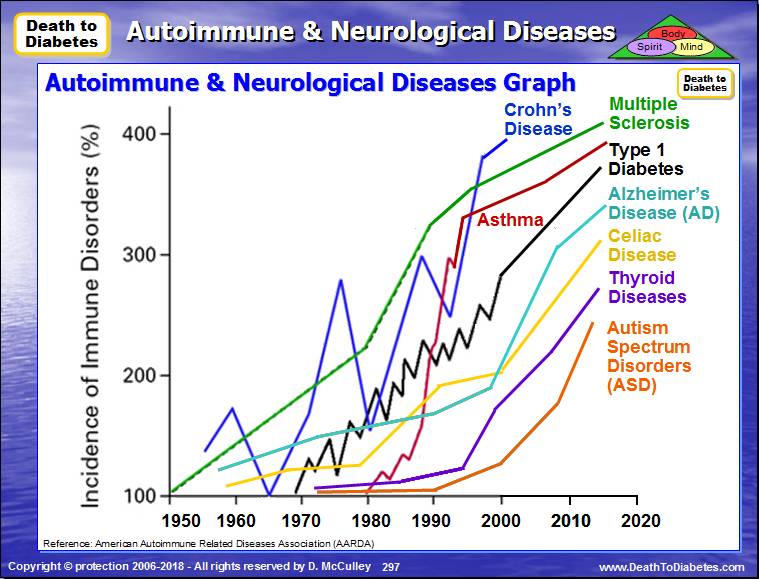23.5 million Americans suffer from autoimmune conditions. I know what it is to suffer from one because I have (had) one. I don’t suffer from mine anymore because I worked to figure out what’s causing it, and I made changes to my “biosphere” to address it. Autoimmune disease doesn’t just happen – there’s a trigger, a reason. Autoimmune conditions are a leading cause of death and disability in this nation. The chart below shows the incidence of some autoimmune diseases, and the incidences are increasing.

Why?The “research” has not come up with the reason(s) why autoimmunity is increasing, but if you indulge in common sense at all, I will look at what’s changed since 1950. I’m not sure we can come up with just one reason, but here are some hypotheses:a. There are 30,000 synthetic chemicals in use today that were not in use in 1950. No studies have been done to understand how the combination of all those chemicals impacts humans. It’s not possible to do that study because you simply could not re-create an exposure to that many chemicals in a way that humans are actually exposed to them in real life. But common sense tells us that exposure to 30,000 new chemicals by an entity that has never experienced them before have to be problematic.b. Processed foods – we used to cook with whole foods – now we buy foods loaded withchemicals. Can I quote a study pointing out how bad this is for humans – No, I can’t. Can I apply somecommon sense logic to the situation – yes I can. Throughout history, humans have cooked foods from scratch – processed foods in mass started arriving on the scene mid-20th century.c. All foods used to be organic – meaning they were grown in fields without herbicides andpesticides. Now organic foods have to be labeled as such, and synthetically treated foods are not labeled. Draw your own conclusions.d. Scientists/ farmers used to take great pride in hybridizing crops to ensure the best attributesof a specific crop were maintained and encouraged. This required splicing genes together to create a heartier, healthier, more attractive crop. Bees also helped “hybridize” as they would transfer material from one crop to another, creating natural hybridization. Now, we have GMOs. GMO is the process of inserting a virus into the mitochondria of a cell so that it expresses differently. Yes – you read that correctly. In order to genetically modify an organism, you insert a virus into that organism. Again, I’ll letyou come to your own conclusion.Do any of those things contribute to autoimmunity? I don’t know. As a thinking person, it would seem that it’s likely, but the reality is we don’t know. We may never know. For now, I’m going to do my best to control my own biosphere and let the food scientists work in their labs – I’ll bet on nature over their profit-driven science any day.
Autoimmune simply means that your body’s immune system sees your body as an invader, a foreign substance that does not belong in the body.
We want the immune system to respond to foreign invaders, but for some reason, your body thinks the body itself is the invader. The body then attacks the invader creating unwanted symptoms for you, the host.For example, with Hashimoto’s or Graves, the immune system attacks the thyroid. Rheumatoid Arthritis is diagnosed when the body attacks joints. Lupus causes inflammation, and in that condition, the body can attack pretty much any bodily tissue, including the vasculature and critical organs. In Scleroderma, the body attacks the connective tissue. While the manifestation of these diseases differs, the commonality is an immune system that has somehow misinterpreted the body as an invader – or does it?We have a way of taking symptoms that commonly appear with each other, and we combine them into a single diagnosis. Then conventional medicine works to create a pharmaceutical drug that will stop the immune system from responding – to treat the diagnosis. The problem with that is that in almost all cases, the drugs shut down the immune system and, in many cases, increase the likelihood of cancers and other diseases that a healthy immune system regulates in the body.Once the diagnosis is made, we take ownership of our condition and use terms like “I have lupus”, or “I have rheumatoid arthritis.” We refer to these diagnoses as if somehow we went out and acquired them, and now we have them, and they’re ours. They become a part of our psyche, a part of our personality, sometimes a part of our ego.Don’t get me wrong – the symptoms are real, the pain, the fog, the fatigue, the discomfort, themalformation – all of it real, all of its symptoms we suffer from and with. In most cases, there is no conventional treatment that heals autoimmunity. Conventional treatment controls the symptoms, but if you ask your MD when you’d be able to stop the medication, you’ll likely hear “well never –you have to be on these drugs the rest of your life.” That may or may not be true.
What I do know is that if you don’t make any changes to your terrain, you will be on medication for the rest of your life, and the only way to give yourself a chance of healing is to make changes to your terrain – your biosphere.
You live in your own biosphere. Your biosphere is different from anyone else’s, that’s why your diet, stress patterns, sleep patterns, exercise levels, and your relationships all inform your specific health outcome – whether the outcome is full of unwanted symptoms or desired levels of energy and happiness.You may have been diagnosed with an autoimmune condition – but that doesn’t need to mean a life sentence of suffering. If you’re interested in learning more about what you can do to create a terrain that synthesizes health alongside me, contact me to book in here.Sincerely,Dr. Kenton Anderson

